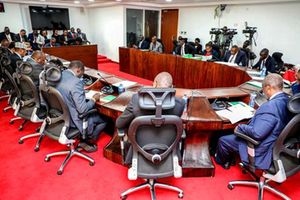
President William Ruto chairs a Cabinet meeting at State House, Nairobi, on April 29, 2025.
Keen to stay ahead of another angry June like happened last year when anti-tax protesters invaded Parliament, the Cabinet has promised lower taxes in the next fiscal year, even as the Finance Bill 2025 remains akin to a State secret in the hands of few trusted bureaucrats.
Neither President William Ruto’s Cabinet, the National Assembly nor National Treasury has availed the document for public scrutiny.
National Assembly Speaker Moses Wetang’ula informed members he had received the draft Finance Bill, 2025, from the Cabinet Secretary for the National Treasury, but it was not immediately available for public scrutiny with Parliamentary orderlies citing bureaucracy.
“This Bill relates to the revenue-raising measures that support the submitted budget. Upon its publication and First Reading, the Bill will stand committed to the Departmental Committee on Finance and National Planning for consideration and facilitation of public participation,” Mr Wetangu’la told MPs.
Wastage of funds
While National Assembly clerk Samuel Njoroge said that the document is still undergoing internal processes such as proofreading before tabling, some State officers had already seen the draft document and even started circulating some of its contents on social media, even before its official tabling in Parliament.
Under the Public Finance Management Act, the National Treasury must submit the Finance Bill in the National Assembly by April 30.
The Budget and Appropriations Committee of the National Assembly is then required to introduce the Bill to the House.
The National Assembly must ensure that the document is ready for assent, or dissent, from the President by June 30, so as to allow the Kenya Revenue Authority to start collecting taxes from the first day of the new financial year.
If the Finance Bill is not enacted, as happened in 2024, the previous year’s Finance Act and other relevant laws remain in operation.
Last year, the Finance Bill was tabled in the National Assembly on May 13.
In a statement yesterday, President Ruto’s Cabinet glossed over sections of the Finance Bill 2025, tiptoeing around thorny issues which triggered protests last year like taxation, plugging wastage of funds, government borrowing and the treatment of small businesses.
Demonstrations
Initially, last year’s demonstrations started when a number of youth raised concerns about new taxes, many of which stemmed from additional revenue raising measures imposed by the International Monetary Fund (IMF) as a condition for funding budget deficits.
But as the weeks progressed, other issues like wastage of public funds, extravagance by public officials and alleged mistreatment of small businesses joined a long list of grievances.
At least 60 people were killed during three-month protest period, which left hundreds injured.
On Tuesday, the Independent Policing and Oversight Authority (IPOA) said that it is still investigating several deaths, nine of which occurred at Parliament Buildings during an invasion on June 25, 2024.
A day after the June 25 countrywide protests, President Ruto declined to assent to the Finance Bill 2024, fired his Cabinet and issued several directives aimed at cutting wastage of public funds, before pursuing a political entanglement with opposition leader Raila Odinga and the ODM Party.
Aside from stating that the 2025/26 budget will be trimmed from the initial Sh4.3 trillion, the Cabinet said that the government will target tax cheats and hasten the tax refund process instead of imposing more levies to raise more revenue.
President Ruto’s team said that the Finance Bill will minimise tax raising measures, ensure quick release of tax refunds and help fast track determination of tax disputes.
“Key provisions include streamlining tax refund processes, sealing legal gaps that delay revenue collection, and reducing tax disputes by amending the Income Tax Act, VAT Act, Excise Duty Act, and the Tax Procedures Act,” the Cabinet said in a statement.
Small businesses
“Notably, the Bill proposes critical changes to support small businesses, allowing them to fully deduct the cost of everyday tools and equipment in the year of purchase, thereby eliminating unnecessary delays in accessing tax relief,” the Cabinet added.
But even as President Ruto’s team talks up the document, whose mere mention sparks memories of the three-month long protests that grabbed international headlines, only the makers and a handful of government bureaucrats have laid their eyes on the Finance Bill.
Treasury CS John Mbadi and PS Chris Kiptoo had not responded to our requests for a copy of the Finance Bill 2025 by the time of going to press.
The speaker also directed the budget estimates for the 2025/26 fiscal year, that have since been tabled before the National Assembly, be referred to the departmental committees and the Budget and Appropriations Committee for detailed consideration.
“The departmental committees are expected to engage with relevant stakeholders and ensure broad-based participation in the scrutiny process,” he said.
“It should be noted that the Budget and Appropriations Committee is required to review the budget estimates and make recommendations to the House, taking into account the reports of the departmental committees, the submissions from the Cabinet Secretary for the National Treasury, and the views of the general public,” he added.
Tax frauds
Mr Dennis Itumbi, the head of presidential special projects and creative economy coordination, on Wednesday shared on his verified social media pages a graphic indicating some of the proposed tax cuts, an indication that he may have seen the document.
On the Cabinet communication on hunting down tax frauds, Mr Itumbi expounded by stating that data analytics and tighter audits will be used to trace suspicious refund claims.
He added that the digital service tax, currently at a 1.5 per cent rate, will be scrapped while levies imposed on cryptocurrencies will be halved to a rate of 1.5 per cent.
Those measures were not in the Cabinet communication released on Tuesday.
He further stated that aircraft spare parts for repair and maintenance will be tax exempt if the Finance Bill is assented into law.
Mr Itumbi did not respond to our requests for a copy of the Finance Bill 2025, or confirm whether his graphic was based on his assessment of the document.









